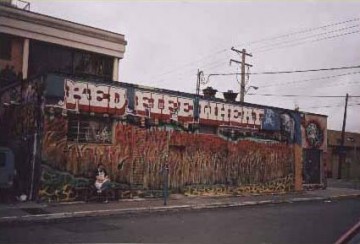Slow Food ‘Ark of Taste’ Red Fife wheat

(photo credit Sharon Rempel - the wall of Wild Fire Bakery, September 2003)
Wild Fire Bakery in Victoria launches ‘Red Fife’ wheat in their bread! and build a silo in their backyard for 2 tons of wheat!
September 14, 2003 was a historic day for Red Fife wheat in Canada. Wild Fire bakers Cliff and Erika baked loaves of artisan sourdough bread in their brick oven, using Red Fife wheat grown on Lionel Blais’ farm in Saskatchewan.
Wheat is generally sold as ‘wheat’, without knowing who the farmer was and what the variety of wheat might be. Yet SLOW FOOD celebrates the link between the farmer, the variety and the final food product.
On the 14th, bread was shared at a SLOW FOOD event held at Fairburn Farm, the home of Canada’s only water buffalo herd. Various main course items included water buffalo meat. A local television crew filmed Sharon Rempel who has kept an orphanage of heritage wheats alive since 1988 as well as Cliff Leir, co-owner of Wild Fire Bakery, Pat Reichart who runs Salt Spring Flour Mill and Michael Doehnel who grows ancestral wheats in Saanichton B.C.
September 21 is the Feast of Fields celebration on Vancouver Island. Red Fife bread will be baked on site and shared with participants.
The process of having a heritage variety like Red Fife become known takes a number of people who come together with a shared vision. Rempel started Seedy Saturday in 1989 to bring diverse groups of people together with a shared vision about saving old varieties of plants and swapping seeds with each other. This concept of ‘building community’ around seed collections might be new in Canada but is centuries old in other parts of the world. Not only are traditional seeds valued but also the ways the seeds are planted, saved and used by people.
From 1988 to 1997 Rempel offered heritage wheat to interested people through Canada’s Heritage Seed Program. In 1998 she formed The Garden Institute of Alberta to administer the Heritage Wheat Project. Dan Jason (Salt Spring Seeds) and Jim Ternier (Prairie Grown Seeds) have offered heritage wheat since the late 1980s.
In 1998 Onoway farmer Kerry Smith and Rempel set up a field quarantine station on his farm so old varieties of wheat could be grown out and Smith grew out dozens of heritage wheat.
In 1998, Jennifer Scott and David Patriquin launched the Maritimes Heritage Wheat Project. They found that Acadia wheat not only thrived in their bioregion but also was tolerated by people who could not tolerate modern bread wheats in bread.
In 2000 Walter Walchuk and other members of the Alberta Organic Association conducted field trials of modern and heritage wheats, including Red Fife on organic farms. Not only did this allow them to bulk up seed but to observe how the varieties did in modern organic growing conditions.
In 2003 Red Fife became interesting to SLOW FOOD thanks to the efforts of chef Mara Jernigan and others on Vancouver Island. In a few months, a community of people dedicated to introducing Red Fife back to the world has formed. It includes artisan bakers, chefs, organic farmers and people who love a good loaf of real bread with a variety and farmer preserved identity.
‘Wheat’ has been a commodity taken for granted as part of ‘life’ in Canada. Modern wheats are hybrids and flours are often enriched with additives to give flavour and nutrition. Modern breads made with fast acting yeast cause digestive problems for people. ‘Taste’ is not considered a criteria used in judging wheat in Canada.
SLOW FOOD is about taste. Red Fife is the first nomination by SLOW FOOD Canada to the Ark of Taste. http://www.slowfood.com/eng/sf_arca_presidi/sf_arca.lasso
Phone: 250-381-3473
Address: 1517 Quadra, Victoria B.C.